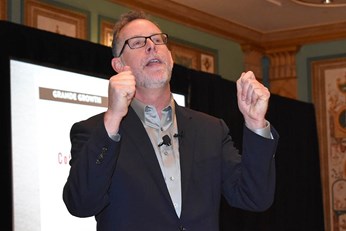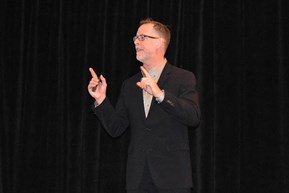Las Vegas—John Moore, the keynote speaker at RISE’s 12th Annual Medicare Marketing & Sales Summit, offered attendees a jolt of “espresso shots of business wisdom” that he has gleaned over his long career as a marketing strategist, including his role that turned Starbucks into a global icon.




 Moore, who also served as the director of national marketing for grocery powerhouse Whole Foods Market, suggested that attendees use the following “quick hits” to think differently about their businesses and roles:
Moore, who also served as the director of national marketing for grocery powerhouse Whole Foods Market, suggested that attendees use the following “quick hits” to think differently about their businesses and roles:
1. Be influenced by the “growth paradox.” That paradox, he says, is the smaller your business, the bigger you must look. That means you must make meaningful connections with your clients, so they trust that you’ll be around tomorrow. But conversely, the bigger you are, the smaller you must get. Moore explained that when a small business becomes a big business it often has put so many processes in place that it has lost its connection to people. That’s why when businesses grow too big, CEOs will often announce that the companies will go “back to basics” to cut out bad growth to act like a smaller, more nimble company, he says. Takeaway: Develop and maintain a “do not compromise” list of values. Refer to the list from time to time as your business grows. The goal, he says, is to keep growing your business without compromising your values.
2. Think about “being” strategies—not branding strategies. Moore quoted Scott Bedbury, the former chief marketing officer at Starbucks, who once said, “The best brands never start out with the intent of building a great brand.” Takeaway: Build your business to create your brand, Moore says. “If you build a business that (a) makes money, (b) makes customers happy, and (c) makes employees happy... then you will create a strong brand. A great brand is the by-product of doing everything else right,” he says.
3. Obsess about customers, not competitors. Many times, he says, companies get caught up in what their competitors are doing and to counteract may work on putting products out. But when businesses treat products like commodities, they treat their customers like commodities, according to Moore. All companies face marketing problems. If they reframe those issues as “people” problems, perspectives will change for the better. For example, a company may suffer from sluggish sales growth because not enough people are buying the product. Takeaway: Products and programs do not grow sales, he says. Only people grow sales.
4. Customer service differs from customer experience. Moore says that he used to think the two terms were one and the same, but they are very different. Customer service starts when the customer experience falls apart, he says. Customer experience is about “designing, delivering, and delighting.” It should be a flawless path, where a customer makes a purchase and is delighted with the product. But at some point, something may go wrong in that path. That’s when customer service is called in to intervene. Customer service, he says, is about “reacting, rescuing, relaying.” So, when that mistake happens, it is what happens next and how we react that turns that customer experience into something good or bad. Takeaway: Competitors can replicate your products, programs, and services, Moore says. But they can’t replace your people who deliver upon the customer experience and provide customer service.

5. The employee experience also matters. Research shows that the more engaged employees are, the more financially successful a business will be, Moore says. He used the example of the business model of The Container Store. The retail outlet has less than 10 percent turnover of its frontline sales associates. The company pays these frontline employees two to three times more than similar retailers, provides new hires with more than 160 hours of paid training as part of the onboarding process and offers employees a 30 percent discount on anything in the store. They also strive to hire only great people, he says. Takeaway: Don’t underestimate the importance of hiring passionate employees when you grow a business. To ensure you hire the right people for your team, conduct a “passion test” when hiring new employees so you don’t just hire “warm bodies.”
6. Rethink innovation. Redefine innovation as progress past perceived potential. Reimagine it, Moore says. An idea without action is imagination. An idea with action is innovation, he says. And innovation doesn’t always have to be an immediate game changer. Incremental innovation is perfectly fine, Moore says. Takeaway: He suggests a four-part process to activate innovation. First, investigate what is wanted, needed, or wished. Second, think about what can be changed or improved. Third, evaluate which ideas best address the challenge. Ask yourself, what is the risk of not doing it? Finally, consider who must be persuaded.
7. Find meaning. Moore challenged attendees to find meaning in what they do. “You work in the health care business. It’s the most personal business out there…. you help people live longer, healthier and better lives.” Purpose-driven businesses deliver higher-quality products and in many instances have more satisfied employees, according to Moore. Takeaway: “Before people can buy from you, they’ve got to buy into you.” Consider what makes you different from everyone else. Moore offered an exercise to help attendees uncover a deeply held motivation for why people should buy into their organization or health plan. First, he suggests, make a descriptive statement about what your business does. Then, ask “why” that is important. Once you’ve asked a few “whys” you will uncover a fundamental reason for why your business exists, he says. Other things to ask yourselves: If your business didn’t exist tomorrow, would anyone care? Would anyone miss you? Could your customers find another company that could serve them as well? Think about your own passion. What gets you up in the morning? “If you are excited, your team is excited. And if your team is excited, your company is excited, and your customers will be excited. You are not just changing your world, you are changing your company’s world,” he says.
